D2D Interview: The Houston Brothers
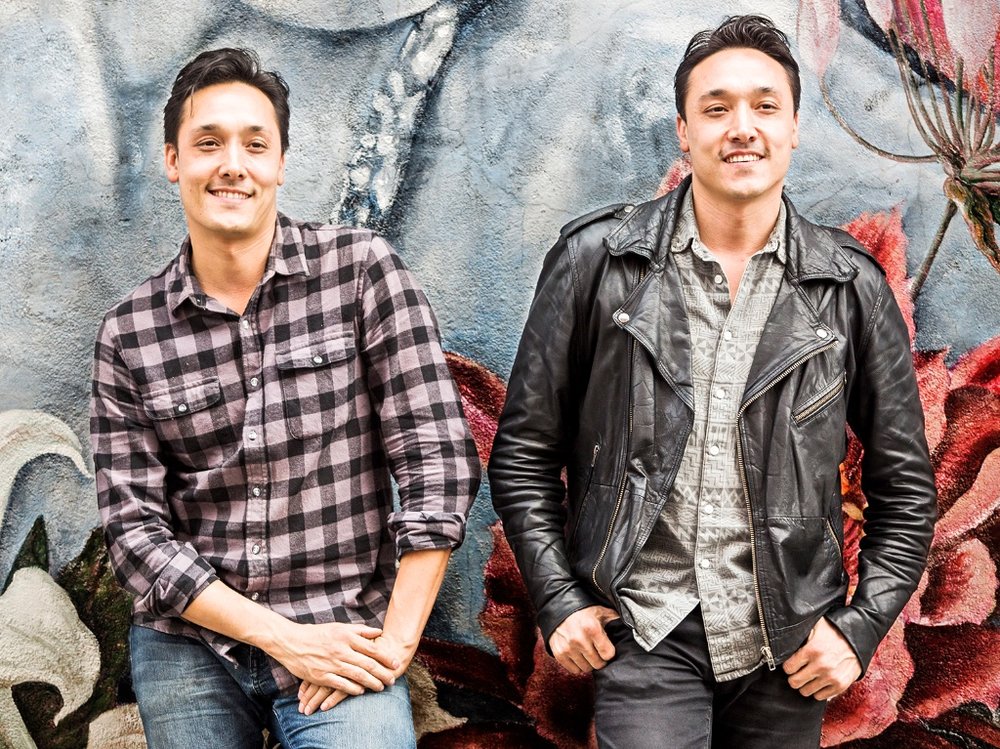
Of the seventeen D2D interviews I've already conducted—a pretty eclectic list of intriguing personalities—I'm most excited for all of you to read this one. If you're like me and you think the American food and wine scene is beginning to take itself a bit too seriously, with trendy bars and restaurants that are trying to impress you rather than take care of you, I present to you now the antidote to that poisonous posturing. You may remember Mark and Jonnie Houston from a little exposé I did on their Hollywood empire this past August—an inspiring romp through some of the most creative and imaginative bars I've ever visited. Now I'm back hanging with the twins once again, this time giving them the chance to explain their incredible hospitality experiences in their own words. I can't say enough about how much I love these two guys and how drawn I am to their general philosophy as it pertains to the perfect drinking environment. The Houston brothers have created nine thematic destination spots—each with its own sense of place—that are as concerned with atmosphere, energy, and showmanship as they are with presenting you with a great libation. The only thing intimidating about them is that they seem to do everything extremely well.
I'm hardly the first person to feel this way, either. When you walk into their iconic 1970s-era house party of a bar, Good Times at Davey Wayne's, you can feel the energy in the crowd—even on a Wednesday weeknight. There are no snooty bartenders with stoic, solitary stares of pure contempt. There is no pretense, nor is there even the slightest bit of self-aggrandizement. All you'll find is a crowd of people having a great time, possibly drinking alcohol out of snowcones, with one or both of the Houston brothers right smack in the middle of it, leading the charge towards that good time they promised you. And don't think they're ready to stop now. These two dynamic entrepreneurs are just getting started, and I for one cannot wait to see where they go next.
In this edition of Drinking to Drink we talk putting the fun back into the bar scene, the ever increasing standards of cocktail quality, and how ultimately you need a bit of magic to make everything come together perfectly. Previous editions of the D2D series can be found by clicking here, or by visiting the archive in the right hand margin of the blog.
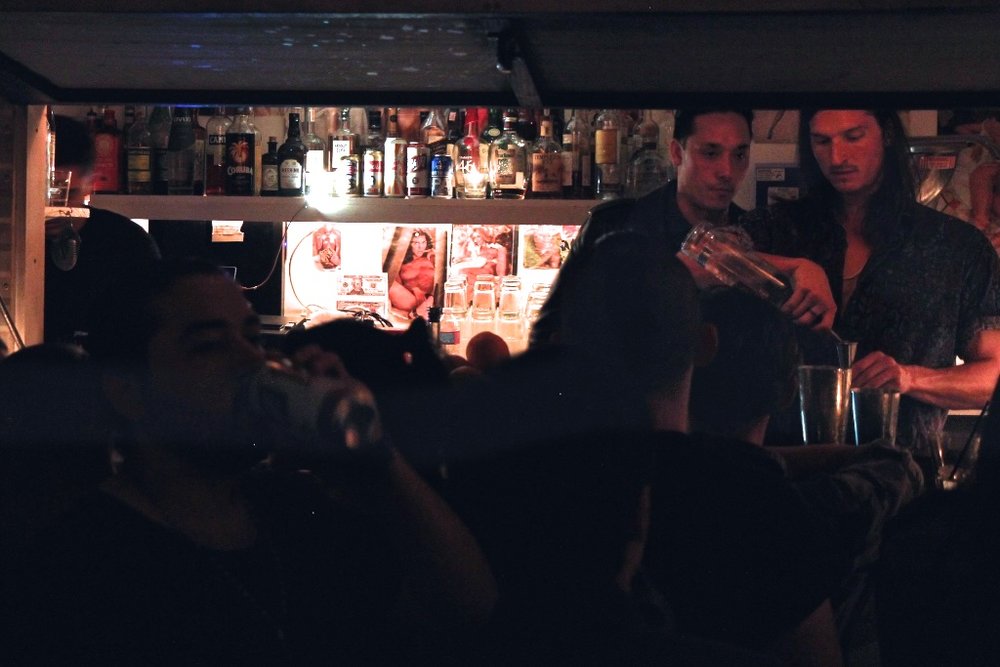
David: So when I was down visiting your spots in LA a few weeks ago, Mark told me about an encounter he had in college with a professor who told him there was no better education in business than to simply go out there and do it. Which is exactly what you guys did. You guys dropped out of school and created a bar and restaurant empire in Hollywood.
Jonnie: Right, but when we first dropped out we went into the cell phone business. That was the big thing at the time. Mark did speak to a professor who told him, “If you want to get into business, then just do it,” and it proved true. It worked for us, and that’s when Mark and I first started working together closely. Even though we would have our differences, and argue like brothers do, it turned out to be the best working relationship that either of us had had. We did have other jobs prior to this, but none of them ever felt organic.
David: So you eventually decide to jump into hospitality.
Jonnie: Jumping into the hospitality business—having grown up in LA—wasn’t really for us at first because everything we were exposed to at the time just wasn’t appealing. You had these huge night clubs with flashy lights and super rich guys posturing for position. It was so showy. Either that, or you’d go to a dive bar—and I appreciate dive bars—but you can’t really take your girlfriend there for a night out without having some guy hit on her, or worrying about a fight breaking out. It felt like there weren’t any comfortable places where you could meet interesting people and have a conversation.
David: And you guys looked to remedy that?
Jonnie: Just creating a safe environment for people to get together and hopefully make new friends was something we wanted to do—to create an extension of our living room or a dinner party. Without having to do all the clean-up at the end of the night (laughs).
David: When did this idea actually become a reality?
Jonnie: It came to a reality by us just falling into it. I had a cell phone store next door to the place that would become our first bar and the spot became available. It just felt right. It was perfect timing. Mark and I grew up in the bar business. Our mom was a bartender. Our dad was a barfly. We grew up around restaurants. We peeled shrimp for our aunt’s Thai restaurant and passed out fliers on the street, door to door, as children. We were always around hospitality and—truthfully—I don’t think either of us longed to get into the bar business. We had a different idea of what it was. We hardly saw our parents, my mom would work late nights and when she got back she was always tired. My dad went out almost every night, so in a way it kinda put a bad taste in our mouths. It wasn’t until we started doing our own stuff and saw the potential to create a different environment that we decided to get into it—a place where you could go and didn’t even have to drink really. You could simply socialize and have an experience. That was the impression we wanted to leave in the minds of people.
David: So the first bar is the Piano Bar. This is the spot you decide to start out with.
Jonnie: When we walked into the available space we realized it was an old, run-down gay bar. I won’t go into all the details, but it was like a male meat market (laughs). We could see the potential of the location, however. That’s one thing I think Mark and I do well—envisioning the process of creation and coming up with a plan. The main thing that we wanted to create there was a safe environment for live music where you could hear a piano player while relaxing and having a good time. That was the inspiration. It has a New Orleans type of a feel with gas lamps and brick walls, along with great jazz musicians who play there on Wednesdays and Fridays. Great piano players, too. This is a place where you can come with friends, see a show, and not pay a cover fee. Unlike the Roxie and Whisky-a-Go-Go, for example. This was a casual setting where an artist could just pick up a guitar, play for everyone, and feel comfortable,
David: That sounds amazing, especially as I continue to grow tired of the pretentious live music scene as it pertains to bars and clubs.
Jonnie: What evolved from that was incredible. A lot of artists who would play at the Hotel Cafe nearby, they would play their big shows, then afterward walk over to the Piano Bar and just jump on stage and play there as well. Everybody from guys like Craig Robinson—I don’t know if you know him from the movie Hot Tub Time Machine.
David: I love Craig Robinson. He had the all-time best cameo ever on Reno 911 where he plays the keyboard and sings for the Sheriff’s Department commercial.
Jonnie: Well, he’s a good friend and he loves singing and performing. He’s jumped on the piano on many a night. He does it just for fun, just for the enjoyment. There’s a list of other celebrities too who have also just spontaneously performed. It’s those impromptu moments, those memories that are created, that really inspire us to keep to doing what we do.
David: Plus, that’s just pure word-of-mouth buzz. If I’m sitting at a bar and I see some celebrity just hanging out with the crowd, performing on stage just out of the blue, I’m thinking that’s a pretty cool place to be. That’s a place I want to be as often as possible.
Jonnie:: It is cool! We don’t really publicize it though and I think that’s why a lot of these people feel comfortable doing it. They know it’s not going to end up on TMZ or some other celebrity rag.
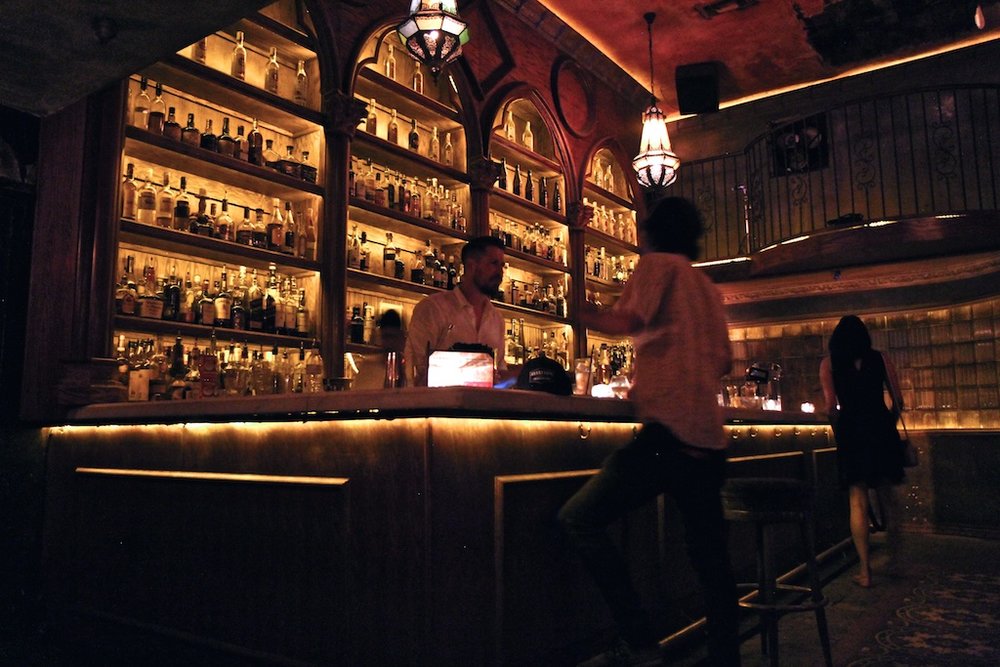
David: So you guys ride the success of the spontaneous happenings at the Piano Bar into your next project: La Descarga. Mark, why don’t you jump in and talk about how the thematic elements came into play. You’ve got a very specific Cuban-inspired theme with a unique Speakeasy-style entrance.
Mark: La Descarga really marked a change in how we looked at night life, with me having gone and traveled to the Caribbean, to restaurants in New York and San Francisco, where cocktail cultures were really getting started. This is about six or seven years ago. We wanted to create our own cocktail program, infuse it with live entertainment, and create something that was more of an experience rather than just a bar. We liked the idea of a space where you couldn’t pin-point exactly what it is. It’s not a nightclub, but it feels like it because you’re dancing, you’re getting sweaty, and you’re having a great time. It’s not a cocktail bar because it’s not necessarily mellow and chill. And it’s not a theater or a stage where you sit down for an hour and then leave when the show's over. It’s all of these things mashed up, so it took a lot of planning to try and figure out how this was all going to work. But it was kind of like magic, too.
David: In the way it all magically came together?
Mark: Yes. You can’t always plan certain things, they just happen, and for Los Angeles it really set the tone for a new way of going out. We did a reservation process, which was totally unheard of for a bar. You actually had to plan it out, and when you do that—that’s a date! You’re taking someone out on a date for a specific experience. Reservation for two, 8 PM. I think adding a dress code also issued a new statement because—as you know—LA is pretty relaxed when it comes to going out. These things created an experience and experiences would happen because of it. We had the Piano Bar where the guys from ZZ Top might jump on stage and play for everyone. Then we’re doing this Latin-themed bar where Andy Garcia might drop in, or the Buena Vista Social Club. As a culture I think we like to travel because we want to have new experiences, but not all of us can travel year-round. We wanted to mimic that same sense of inspiration that you might get by taking a journey.
David: In a sense, you were bringing your experiences from traveling back home for others to enjoy.
Mark: Right, I would travel and then experience something and think, “I want to bring this back to LA.” I met this girl once who was really into cigars and it was the sexiest thing, but then I went back home and went out to a cigar lounge, and it was so….scuzzy. It was like a typical gentleman’s club. I looked around the room and thought, “You’ve gotta be kidding me.” The environment was not the vibe I was looking for, so I thought we could create a better version. A place where guys and girls could go and feel comfortable, where you could also dance, and there was fun going on all around you, I thought that was the direction. So we have a cigar lounge at La Descarga and we have people of all types, of all ages, coming in to enjoy the atmosphere.
David: And how has La Descarga gone over with the industry do you think? I thought the live salsa dancing was incredible when I visited.
Mark: Quite well. We were nominated a few different times at Tales of the Cocktail. It really resonated with the cocktail culture and the industry. This was our first attempt to incorporate live dance into the routine and since then it’s been—not really a formula or an approach—but it definitely has some role in every venue that we’ve created since. We continue to want to create venues that have an outlet for professional dancers who are open to dancing in our locations, creating an experience for the guests.
David: What you guys have been able to accomplish is simply awe-inspiring. To hear you say that you’re traveling around the world, collecting experiences, and bringing them home—that’s what I do as a buyer for K&L. Except that I do it merely with bottles. These are actual objects that I put on a boat, have them shipped, and then give to people. That’s easy. But you guys are bringing concepts, theories, and experiences—they’re ideas that are somewhat opaque. You then have to get home and turn those ideas into something clear and visible. It’s much more difficult, in my opinion.
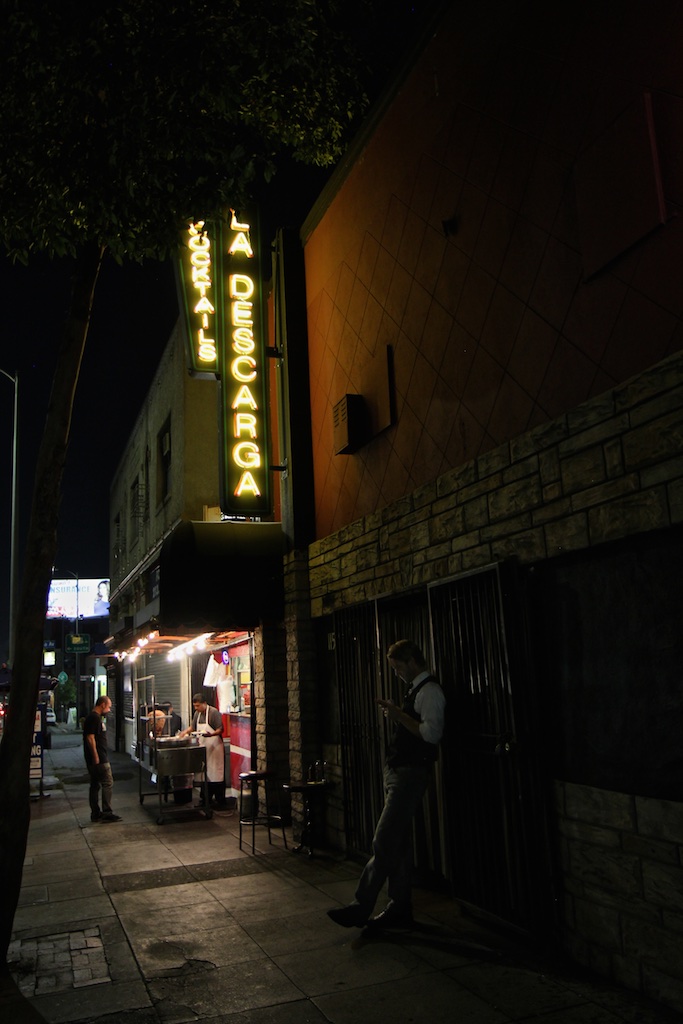
Jonnie: I think you’re right when you say that what you do is similar. When you bring that special wine or spirit back from your trip, and you pour it at a dinner party, and everyone get’s that little taste of a country or whatever you were inspired by, we do that same thing. We like to incorporate spirits that correspond to these themes. With La Descarga it was Cuba and we wanted to bring in Havana Club rum—secretly we did in the back room. You want to create that complete experience down to the beverages themselves.
David: That bar is one of the most beautiful bars I’ve ever been to—just in the aesthetics of the interior. You walk in and you think, “Wow, this is beautiful.” Then a salsa band shows up and starts playing music on a balcony over your head, and people start dancing on top of the bar. You talk to the bartender and he’s super friendly. He makes you a great drink while maintaining a kind demeanor. I mean, what more can you ask for? You guys have every aspect of this covered. Most other places would be happy to have one of these elements, but you have all of them!
Mark: I wish I could say we planned it like that, but it was really just magic. It was just something that happened. Believe me, there was some fear and a few doubts. Even my brother wasn't sure about the dancers, but it worked out.
Jonnie: Yeah, Mark was definitely more into the entertainment and creating an experience with that entertainment. At first I was skeptical. These are burlesque dancers doing salsa. I wasn’t sure how people would take it. But it was magic, and in doing La Descarga we really found our formula. Every day we’re perfecting that formula. There’s a misconception out there where people think, “If I can do great cocktails then I’ve got a great bar.” I think people are getting more savvy, however, and the customers’ eyes have been opened to so much more. People want more now. I remember back in the day when you could open up a bar and just put a pool table in the middle of it, and it would be packed.
David: Ha! (laughs)
Jonnie: People now are like, “Well……maybe I’ll walk over there for a 5 o’ clock beer,” but they’re hungry for something more at this point, and I think that’s a beautiful thing. People expect more, and it makes our job that much harder. We’re always thinking of something better, trying to do something more creative, but it’s tough! Following our instincts and traveling to experience different cultures really inspires us. But I think if your inspiration comes from a real place—from somewhere in your heart—and you follow that, it’s possible to come up with something unique and special.
David: So speaking of inspiration close to your heart, let’s talk about the beginnings of Good Times at Davey Wayne’s. You guys are now successful bar owners, you’ve got two clubs under your belt, and you decide to create a bar in tribute to your late father.
Jonnie: To be clear, when we originally planned the project and took over the space our dad was still around. We were actually going with a different concept, but then he passed away and we put the project on hold for a bit. Until you lose one of your parents you really don’t know how it feels, and I think it affected us greatly. At that point, being in the space, it seemed like a natural idea to dedicate that place to him and his memory—to create a piece of our childhood, to make it reminiscent of our living room growing up. Every little detail that we did there—like the coffee mugs, for example—are from our past. Every morning our dad would have his coffee—so he said—but it was really a beer or a mixed drink and he put it in a mug so that he could hide it from us. But we caught wind of that after a while. So because of that we serve our beers in coffee mugs that say “Number One Dad” on the side. The garage entrance is an homage to all the great times we spent in the garage with our dad working on cars or building stuff. Mark and I learned all our skills there, from framing to dry wall, our dad showed us the way and taught us how to do stuff. You don’t realize how important those moments are until you lose them. All the little nuances and lessons your parents teach you that you don’t get at the time. You think, “Why are you making me do this chore?” but it becomes clear later. You remember those moments and you put them into practice later. Dedicating a bar to his memory seemed like the obvious thing to do at that point.
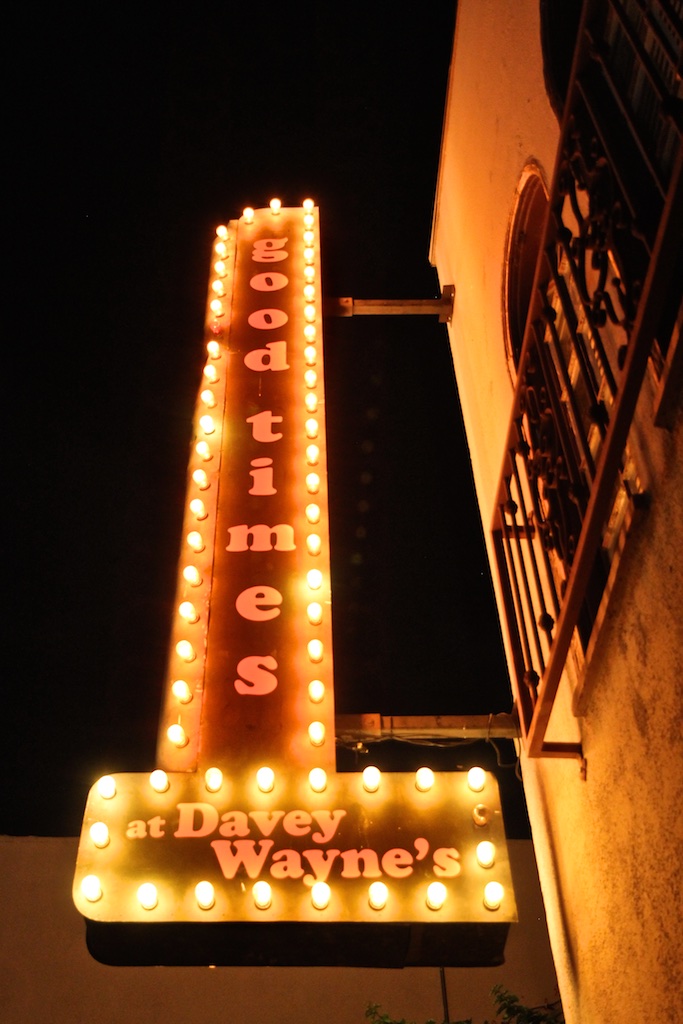
David: The first time I went to Davey Wayne’s was about a year and a half ago and I was absolutely blown away. My jaw was on the ground after leaving there. I came back up here and I told everyone I knew about that place, but the San Francisco scene is so different. Everyone is so fixated on being taken seriously, and in order to be taken seriously you have to show that you’re serious about what you’re doing. I would tell my bartender friends, “No, the cocktails were actually really good!” I had to make them understand that you could have great drinks—every bit as good as what SF is doing—but combined with a thematic experience that was extraordinary. Why couldn’t we do both?
Jonnie: I think that’s the mold that we broke. At this point in the cocktail culture of our modern age, there should be nowhere where you go and have a bad drink. You should be able to go anywhere, get an Old Fashioned or a Whiskey Sour, and have it made properly. It’s ridiculous to not be able to. But why can’t you have fun while doing it? Why do you have to sit down, be quiet, and be told the twenty rules about what you can’t do? Why can’t you drink a cocktail and have fun? Is it illegal? So I think cocktail culture needed to evolve—and still needs to. And I agree with you—San Francisco wants to be taken seriously, and there’s a place for that. However, I think you can be serious and have fun.
David: My question is: who doesn’t want to have fun? Isn’t that why we’re drinking in the first place?
Mark: I think there can be different bars, created for the type of environment that you feel like being in. I think our approach is just something unique and different, where we’ve filled a void with something that was lacking. I don’t want to wait in line at some mega night club with three thousand people, and I also don’t want to go to some dive bar and drink stale beer. I want to go somewhere comfortable, clean, and safe, but maybe with a bit of entertainment. We wanted to give Angelinos something they were lacking. Something inspired from our passion and our own enjoyment. One example is the Speakeasy-style entrance at La Descarga, where we’ve turned that into something more playful and fun. Or like Break Room 86 with the vending machine that you walk through. It doesn’t always have to be a door with a little window that opens up sideways and a guy asking you for the secret password. It doesn’t have to be so literal. This isn’t the 1920s. We’re not actually in the Prohibition era. We’re in a new age where we can re-imagine what exactly a Speakeasy is. We’re having a good time without taking away from the quality of the drinks. People expect fresh squeezed juices, great sweetners and syrups, home-made bitters and whatnot, but we don’t base our bars strictly on the quality of the cocktails.
David: Quality isn’t just about drinks when you go out. I have to say that—of all the Houston brothers bars I visited—the one I’m most excited about going back to is Dirty Laundry, which was the least thematic of the bunch. The reason being the small, club-like room in the back where the house band plays. The band that played when I was there was absolutely amazing. It was new-wave, upbeat, interesting, and catchy. There were only about forty people in the room, you could see the show without struggling, the visuals and lights were fantastic, and it felt like something real was going on in there. My wife and I looked at each other—you know that look when you both widen your eyes and give that expression that intuitively says, "Jesus, this is amazing". We were really impressed.
Jonnie: It reminds me of the Cavern in Liverpool. I think a lot of people gravitate towards that room because there’s a raw energy in there that you can’t explain, but it feels electric. I agree completely.
David: I feel like the third Houston brother being around you both. When I listen to you guys talk I get this energy in my legs and it slowly starts making its way to my head. We’re so similar in the ways that we think and with what motivates us, except you guys are like four steps ahead of me. And I’m used to being four steps ahead of everyone else!
Mark: I think everyone inspires each other and we create. That’s what sparks innovation. I think that’s the beauty of working with my brother. I wouldn’t want to say we challenge each other, but we’re definitely open and honest with our feedback, and that helps us elevate and enhance the experience we’re trying to convey. The best thing about all of this—all these things that we’re building—is that i get to do it with my brother. It’s not work when you look at it like that—it’s fun. Don’t get me wrong, there’s a lot of work that goes into this, but I really enjoy it.
-David Driscoll
